Supporting Strong and Healthy Futures
Meredith Healthcare Alumnae Share Powerful Stories
By Taylor Sexton
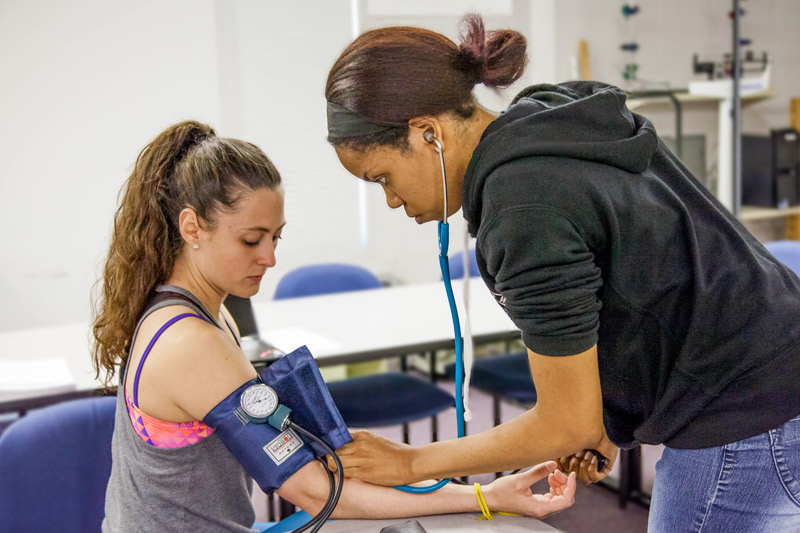
Supporting Strong and
Healthy Futures
Meredith Healthcare Alumnae Share Powerful Stories
By Taylor Sexton
In the last few years, the world has felt the importance of healthcare workers more than ever. These skilled professionals take care of people when they are sick, injured, or struggling with their mental and physical health. They are often the calm and friendly faces people look to in moments of fear and chaos.
The demand for healthcare workers is on the rise. According to the U.S. Bureau of Labor Statistics, healthcare occupations are expected to grow exponentially compared to any other occupation. This growth is expected to add 2.6 million jobs by 2030.
With programs ranging from biology to a pre-health post-baccalaureate certificate, Meredith has a strong track record of preparing students for success in healthcare fields.
We invited some healthcare alumnae to share their passion for their work, and reflect on some of their most powerful memories.
Dr. Geraldine “Gerry” Stott
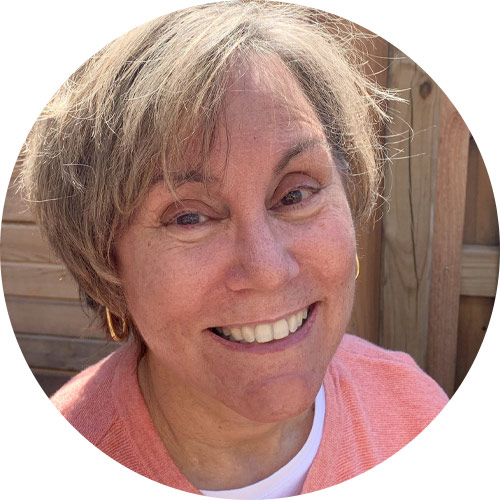
Geraldine “Gerry” Stott, ’80, always considered herself a good listener and found a love for biology while attending Meredith. She realized she wanted to continue her education in biology, which is how she found herself studying immunology in graduate school.
“It’s kind of like a detective story. I get to figure out, ‘Hey, what’s going on?’ So it has the detective like Nancy Drew, it has the medical knowledge, and then it allows you to have interactions with people in a meaningful way.”
Initially working in a lab, she wished for more interaction with people. After being on the fence about what to do, her decision was made for her after an odd experience.
“Although I was a good biologist, what I found was this is not my strength. My strengths were people interaction and science. And then that’s when I decided, ‘Hey, how could I marry the biology portion of it and my interpersonal skills?’ And it was to be a physician. And what clinched it was in the lab, I was bitten by a rat,” Stott laughed.
After Stott’s misadventure with the lab rat, she began following the path to becoming a doctor.
Stott stresses the most important part of her job is listening to her patients. Not only because patients want to feel heard, but because it can contribute to helping her come up with a diagnosis.
“By the time I’ve seen them, they’ve been to multiple doctors. I’m like the last-ditch for them. But never have they just sat there and been able to tell somebody their whole story,” said Stott. “And I’ll tell you, almost all of the time, the answer is in that story.”
One of Stott’s favorite memories stems from early in her career during the HIV epidemic. Part of her job was to visit the homes of those sick and dying from the disease.
“Back then, people who were gay were ostracized by their family. Yet these families were taking them back to take care of them as they died,” she said.
Every Friday, she would drive to rural Pennsylvania to visit the patients and families. One of these patients was an artist whose family converted a barn on their property into a studio so he could create stained glasswork.
“I went to go visit him, and his mom made a great meal. We went to his glass blowing area, and he had made me an angel,” said Stott. “I think that’s my favorite memory. Seeing him reuniting with his family, supporting his art, and even retrofitting a barn so that he could do this.”
The patient passed away a few months later, but Stott still has the stained glass angel he made her hanging in her window at home.
When reflecting on her time at Meredith, Stott remembers the empowering environment created by her professors and fellow classmates. Her confidence came into full-bloom, inspiring her to apply to medical school, so she could then go on to help those who needed her most.
“I really feel like Meredith gave me the opportunity to be a better version of myself – to explore and have the confidence that I, as a woman coming from a smaller women’s college, could apply to medical school,” said Stott. “It’s the environment that really gave me that next step to go forward.”
Jennifer Hartig
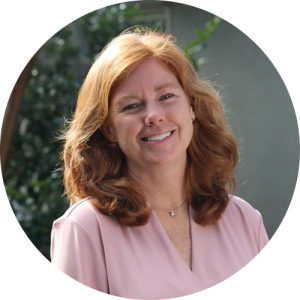
Since she was a little girl, Jennifer Hartig, ’93, felt compelled to care for those who needed it most. She specifically felt a call to take care of the elderly. This is why she’s currently pursuing her nursing degree to help them in a more hands-on way.
“I love taking care of people,” Hartig said. “I always wanted to be able to help them more. And I feel like nursing is the way that I can help people more.”
After graduating from Meredith College with a major in politics and a minor in fitness, she pursued her master’s degree in cardiac rehab from Auburn University.
Once she finished her master’s, Hartig spent the next few years in jobs relating to health and wellness, whether in retirement communities, nonprofits, or as a director at the YMCA. She always felt the desk jobs weren’t meant for her and craved an in-person, hands-on experience.
Hartig told herself that if she could do it over again, she would go to nursing school, but she never pursued her wish. However, that changed once she lost her job because of the COVID-19 pandemic, which pushed her to pursue her dream and finally go to nursing school.
“It’s been a real learning experience. Of course, I had to retake classes I took 30 years ago that didn’t transfer over,” Hartig said. “It’s been a whirlwind. I really can’t believe two years ago I lost a job, and now I’m one year into a nursing program that I’m going to finish this year.”
Hartig works as a patient care technician at a hospital in Charleston, S.C., working 12-hour shifts. Even though the shifts are long, she loves what she’s doing.
She feels her job and patient care technicians, in general, are especially important to patients right now. Because of COVID-19, nurses cannot spend as much time with the patients, and many patients cannot have their families with them. It’s up to her and other technicians to support, comfort, and listen to their patients.
“They crave human touch. They crave people being nice to them and people listening to them,” she said. “I love being able to listen to their stories and try to calm their fears. Listening is what people, whether in the hospital or the world, want to be heard. And I like being that person for our patients.”
Once Hartig finishes nursing school, she hopes to get a job in either cardiac rehab or hospice care. She’s interested in hospice care because she believes the last great thing you can do for somebody is ensure they have a smooth and painless passing.
“I always say either help people die really well through hospice or help people live really well through cardiac rehab,” Hartig said.
Hartig still reflects on her time at Meredith and how she was guided to pursue what she really loves doing.
“I still go back to my junior year, and my academic adviser said, ‘What are the things you love?’ And I said ‘I love exercise. I love old people.’ It’s taken me 30 years, but I think you should find something you love and make a career out of that.”
Sydney Espy
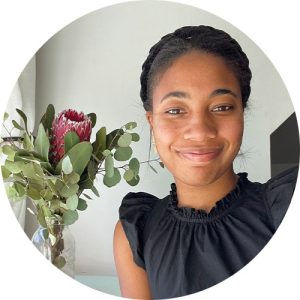
When she got her first babysitting job at age 11, Sydney Espy, ’18, felt a call to work with children. She followed this interest in high school, often taking care of children with special needs. Her path led her to Meredith, where she majored in child development.
“I think I realized that I was good at it, and it was really fascinating to me and just development in general. So that’s why I knew I wanted to do something involving psychology and childhood development,” said Espy.
While at Meredith, Espy took an internship at the Frankie Lemmon School and Development Center as a student-teacher. After graduating, she was offered a full-time position.
“I got a really good internship during my undergraduate years in a field I was interested in. I wasn’t even thinking about social work. I was thinking of early intervention or occupational therapy. But then, with the internship that turned into a job, I realized I wanted to do more with that,” she said.
Now attending graduate school for social work in Boston, Espy works as a mental health clinician at a residential and day school for students with special needs and trauma.
Espy’s day-to-day in her graduate school internship includes meeting with clients for their individual sessions, mental health counseling, data keeping, and meetings with teachers and other therapists. She also leads a group once a week to teach students to be safe and healthy adults.
Another passion of Espy’s is art, which she tries to include in her therapy process with clients. Once Espy graduates, she hopes to work in a K-8 school setting where she can have her own office with materials for art therapy and other hands-on activities.
“I love when I’m working with a client, and I can see them gaining confidence in themselves,” she said. “It’s always so rewarding when I’m talking with them, and we’ve been working on something, and they start to see their own progress and feel proud of themselves.”
Anna Abernethy
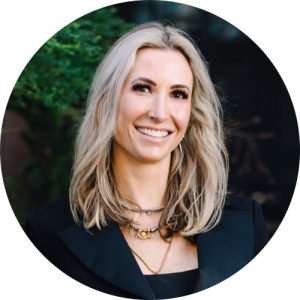
Anna Abernethy, ’01, was just settling into her freshman residence hall when the right side of her face began to swell up. She ended up having an emergency root canal on her first day of classes. This may seem like an unlucky story, but it ended up working out in Abernethy’s favor. Thanks to her plight, Abernethy connected with a dentist, and he inspired her to pursue dentistry as a career.
“I’ve always enjoyed health sciences. I was that weird kid that loved any sort of dissection or animal science. I just loved the idea of learning more about the anatomy or the anatomical composition of things,” said Abernethy.
When Abernethy attended Meredith College, there was no pre-dental program. That didn’t stop her or her professors from creating a pre-dental program customized for her.
“They were really by my side every step of the way. They helped to guide me and figure out what prerequisites I would need to be best prepared for my dental career, more specifically for dental school,” said Abernethy.
Thanks to Meredith’s preparation, Abernethy graduated from dental school at the University of North Carolina at Chapel Hill.
Abernethy said she loves that dentistry is constantly evolving because it allows her to continue nurturing her love of learning and science. Abernethy is married with two children and owns a women-run practice called Renaissance Dental Center, in Raleigh, North Carolina, with two other dentists.
Abernethy cherishes family, whether it be her own or her patients’ families.
“Probably one of the coolest parts of what I do is that I get to see these families grow up together. I get to be a part of their lives,” she said.
Abernethy said she knows many people don’t like going to the dentist, but she aims for her patients to leave feeling cared for and better than when they entered.
“I say at the office all the time, ‘If I can make someone’s experience or make someone feel better leaving than when they first came in, that is to me the ultimate goal in life,’” said Abernethy.
Teresa Keever
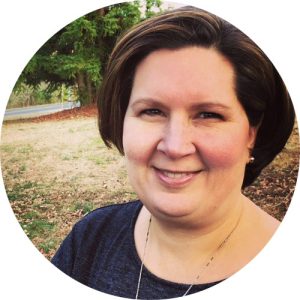
Teresa Keever, ’95, always enjoyed the human connection side of medicine. She’s fascinated by how the human body has the capacity to heal itself, and how nature is able to support the healing process.
“There are ways of doing things in healthcare that sometimes need the human side of it. Sometimes medicine can get really technical, like ‘this is the medicine that you need,’ or ‘this is the procedure that’s given,’ and we really forget about humanness. That’s what underlies all of my interest,” she said.
Keever initially majored in psychology at Meredith. Although not knowing exactly what she wanted to do with her degree, psychology ended up setting the course for her career.
“I could have never planned the steps that got me here, but I do think the foundation I got at Meredith is what allowed me to build on my interest in health and wellbeing, and the psychology piece informs everything else,” said Keever. “I think psychology is a good platform for health and wellbeing because it’s mind, body, and spirit.”
At first, Keever pursued a career as a midwife because of her interest in connecting with patients but realized it wasn’t for her. She ended up landing a job at Duke Health & Wellbeing 10 years ago as a research coordinator, and that’s when she fell in love with integrative medicine.
Integrative medicine focuses not only on physical health, but emotional, mental, social, spiritual, and environmental factors that influence health.
Keever said it was at Duke Health & Wellbeing where she felt she finally found her home. It’s not only her interest in integrative medicine that makes her love her job, but the passion and drives her coworkers have as well.
Broken into three services, Duke Health & Wellbeing has integrative medicine, lifestyle and weight management, and health and fitness.
Now Keever serves as the Associate Vice President, where she oversees the health center and administration for integrative medicine, and overall administrative direction for clinical staff, functions, policies, and procedures.
Duke Health & Wellbeing’s mission aligns with Keever’s core belief to promote whole-person health and well-being and inspire people to live their best lives.
“Once I saw what people were doing here and where it was headed, I just knew I didn’t want to be anywhere else,” she said.
